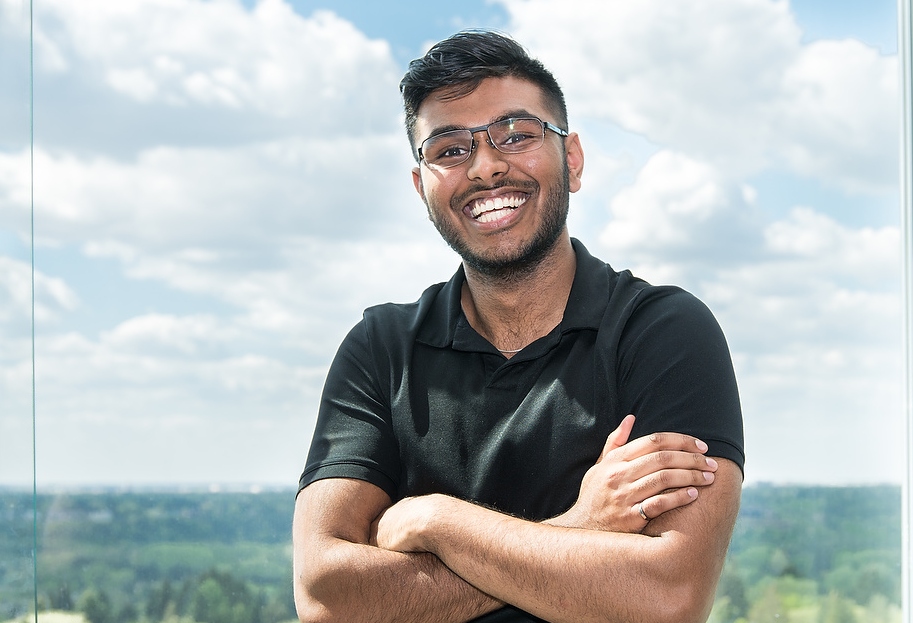
He logged thousands of miles attending international competitions and courses as an undergraduate. And computer engineering graduate Arjun Kalburgi says he's just starting to learn.
(Edmonton) Finish strong. It's good advice to follow, especially when you're working towards an engineering degree. Ask anyone here: it's more marathon than sprint.
This is the approach Arjun Kalburgi took to earning his computer engineering degree at the University of Alberta. In his final year of studies he built a fall-term schedule with no classes on Fridays. Rather than taking the day off, he used his long weekends to travel to hack-a-thons in Philadelphia, Detroit, Austin, and Vancouver. These round-the-clock coding and building competitions helped him develop networking and coding skills-but also took a toll.
"I paid for it the next term. It was a full-course-plus-some class load," says Kalburgi, who adds that there was nothing glamourous about his marathon hack-a-thon mission.
Staving off sleep for at least 24 hours at a time ("I don't sleep at hack-a-thons, I work," he says) and subsisting on a diet of pizza, submarine sandwiches and other such fare, Kalburgi knew he'd have to dig deep in order to complete his degree this spring.
There were highlights during that term, including helping organize two local hack-a-thons, including one hosted by the Faculty of Engineering Computer Engineering Club.
If it isn't already clear, Kalburgi is a fan of hack-a-thons.
"Hack-a-thons are important because they teach people that they're capable," he says. "That is the No. 1 thing. Every student should go to a hack-a-thon and try to make something.
"I think engineers have a fear of failure and that makes it hard for some of them to do new things, and because of that fear of failure, people don't want to go. But a hack-a-thon is 24 hours and you don't realize how much time that is until it's over and you say 'Wow, I did something.' And that fear is gone."
Kalburgi is an animated speaker and a great storyteller. And he's comfortable sharing his opinions.
"I think my degree should be taught in hack-a-thons," he says, smiling.
But it isn't just that hack-a-thons are fun. There's much to be learned from other participants, and it helps develop so-called "soft" skills. The sessions allow you to find a project or a cause you're interested in, write and post your code online, and build networking skills.
"It's the only way I know to get those three important things done in one place."
Kalburgi also took advantage of opportunities to develop his entrepreneurial skills.
Last year he attended a three-week entrepreneurship boot camp at Reykjavic University as part of a University of Alberta mission to develop and pilot the same kind of course here. And earlier this spring, he worked as a teaching assistant in the inaugural U of A version of the course, which brings engineering, science, and business students together to develop a product or service in three weeks.
Think of the course as a three-week hack-a-thon, and you get the picture.
One of the most valuable benefits from participating and helping to teach the entrepreneurship course was discovering the value of interdisciplinary teams, he added.
"What I ended up learning is that students from other faculties don't think like I do. Business students think about companies as filling a hole, and I think of it as inventing something new. Those are completely different ways of thinking. I'm learning to think in that whole other style."
After graduating, Kalburgi will keep his learning momentum going. He's heading to Toronto to take a user interface course, to better understand the bigger picture of his build-something ethos.
"Right now I'm good at building websites and apps that create experiences and I want to learn more. I use code to build stuff-but I want to know more about the design thinking. It's going to be fun."